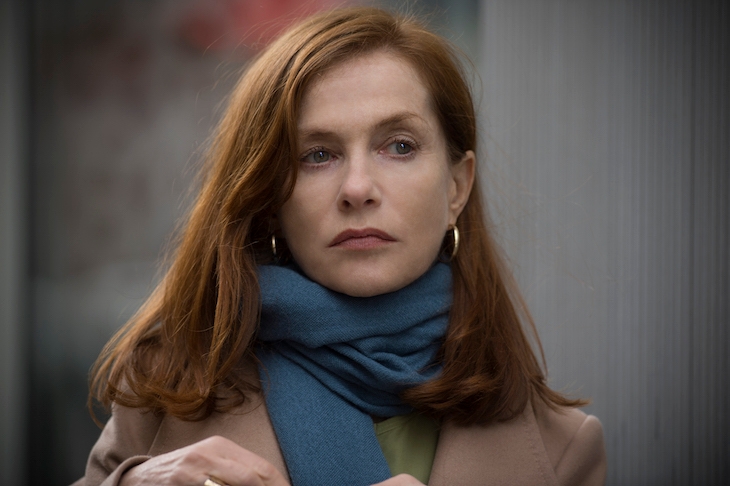Is it possible simultaneously to want a film to win an Oscar and to wish it hadn’t been made? That’s how confused I felt after seeing Elle with Isabelle Huppert – a woman for whom the adjective hard-boiled (in a French way) doesn’t even come close to her unvarying self-possession. Elle, directed by Paul Verhoeven, is about rape, violent rape, and the aftermath of rape, but this is as odd a depiction of victimhood as you can get.
Huppert – Michèle Leblanc in the movie – is plainly brutalised by a sudden attack in her home by a masked intruder, in a wetsuit, who hits her repeatedly to subjugate her – every woman’s worst nightmare. Hearing the attack off camera over the opening credits, you think that’s it, the rape is out of the way, thank God. Oh no it isn’t.
Anyway, to cut to the chase, the problem with the film is that Huppert’s reactions are all wrong. Or wrong from where I’m at. She doesn’t go to the police – because of the way they behaved when she was a child and her father was arrested for unspeakable crimes of his own (men really don’t come out of this well). That’s bad. But reading reviews of the film, you might think that the hunted turns hunter and that she tracks down her rapist and plays mind games with him. Well no, actually. She does identify her rapist, and… sees him again and again, socially, and when she needs help.
Maybe it’s different in the novel on which the film is based: Philippe Djian’s Oh…, published in 2012. Maybe the social encounters aren’t complicity with the rapist so much as some sort of attempt to gain the upper hand through engagement, but the relationship is, as she acknowledges eventually, ‘twisted’. I mean, when someone has raped you, do you go with him into his cellar where, as he helpfully points out, every noise is muffled? No, girls, you do not.
This suggestion, a powerful suggestion, of complicity between rapist and victim is – how can I put it? – unhelpful. Which is probably why, against all the odds, Huppert didn’t get best actress in Cannes last year. Mine is a naïve and predictable reaction but, you know, I don’t care.
It’s an extraordinary performance: funny and deadpan, and she deserves the Oscar, possibly more than Natalie Portman as Jackie. You didn’t think you’d get laughs out of a film about rape, did you? Well, you snigger right through this one. But misogyny runs right through the thing. The production of violent computer games for boys of all ages is Michele’s business, how she makes her money. Which is why she’s violated all over again when someone in her organisation remakes the latest offering, with her face on the body of the CGI female being impaled from behind by a bulbous monster.
What I do know is that this is a psychologically untruthful depiction of a rape victim. I suppose in all the rich variety of human experience anything is possible but this is extraordinarily improbable. A friend of mine was raped in her home, and she didn’t just abandon her flat, she left the country. The notion that she might invite the man, even if socially presentable, to a party… forget it. We get some insight into the nature of rape as an exercise in violence rather than desire when Michèle invites the rapist to have sex and he observes: ‘it’s not how it works’, before getting back to hitting her.
Elle sends out, to use the weaselly phrase, all the wrong messages. Huppert still deserves an Oscar.







Comments